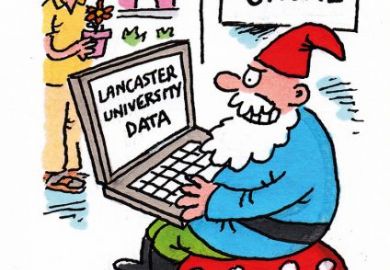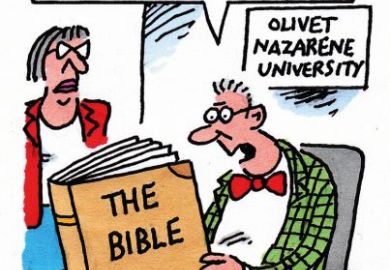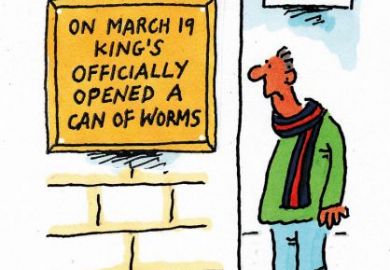
The rise of artificial intelligence has prompted concerns that automation will take over a whole host of human jobs. Now “inventor” can be added to the list. Dabus AI, previously known for creating surreal art, has designed interlocking food containers that are easy for robots to grasp as well as a warning light that flashes in a rhythm that is hard to ignore. However, patent offices insist that inventions be attributed to humans to prevent complications from corporate ownership. According to the BBC, two professors from the University of Surrey and the creator of the AI system are challenging the “outdated” practice and calling for Dabus to be recognised as an inventor. Both the academics and the European Patent Office have recognised that the matter is “complex”, but law professor Ryan Abbott insists that “the whole intellectual property system will fail to work” if AI authorship is not addressed.
What’s in a name? Not much, it turns out, after the University of Bristol spent £20,000 consulting with students about what to call a building, only to discover that students were perfectly happy with the current title. The university paid consultants to conduct a survey about renaming the revamped “Senate House”. However, after a year of advertising, events and whittling down the options for a new name, the results showed that students preferred the original. And so the building will remain Senate House. A Bristol spokesman told The Times the university was “very grateful” to those who had taken part in the consultation. “What it seems to show is that what we call the building is less important than what goes on in it,” he said.
To be the household breadwinner, women need to have much higher qualifications than their partner, a survey has shown. The Australian study found that women were likely to earn more than their male partners only if their other half lacked higher-level qualifications. The longitudinal study of 17,000 Australians in some 9,500 households found that among households with opposite-sex couples of working age, just 20 per cent boasted “female breadwinner” arrangements where the woman earned at least 25 per cent more than the man. However, this proportion climbed to 32 per cent in households where only the woman had university qualifications – compared with 19 per cent when both partners had degrees, and 11 per cent when only the man was university qualified.
Baroness Amos, the director of SOAS University of London, is set to become the first black head of a University of Oxford college. She will become master of University College, Oxford in August 2020, when Sir Ivor Crewe steps down and she completes a five-year term in the capital. Lady Amos has faced turbulent times during her tenure at SOAS, including controversies over cuts to library services and PhD supervision standards. Times Higher Education recently revealed that she had warned that without action, the institution would “exhaust [its] cash reserves” within two years then continue to “haemorrhage cash”, going £19 million into the red. However, SOAS said that since the warning there had been concerted effort to turn the university’s financial situation around.
The student-teacher relationship at university has always been much less formal than it is in schools. And while usually seen as a positive force, it has regularly prompted discussions about where exactly the boundaries should lie. One lecturer at the University of North Florida perhaps should have realised fairly quickly that alcohol in the classroom was going to be considered a step too far, even if the incident did occur in a US state notorious for its partying. Communications lecturer Brian Thornton has been suspended without pay after it came to light that there was alcohol, including a 12-pack of beer, at his end-of-year “Aloha Party”. The police who broke it up remained unconvinced by his argument that he was unaware that the students, which included at least two underage drinkers, had been consuming alcohol. A letter sent to Dr Thornton noted that “there were reports that students in an earlier class may have been drinking”, which is also under investigation, a local news website reported.
Register to continue
Why register?
- Registration is free and only takes a moment
- Once registered, you can read 3 articles a month
- Sign up for our newsletter
Subscribe
Or subscribe for unlimited access to:
- Unlimited access to news, views, insights & reviews
- Digital editions
- Digital access to THE’s university and college rankings analysis
Already registered or a current subscriber?






